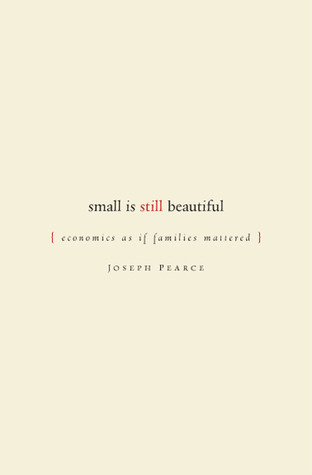This odd little book has a point to make—the title says it all—but it is a point that was made 34 years ago in a book that sold millions of copies and became famous around the world. Exactly why it needs to be restated isn’t clear, and Joseph Pearce never bothers to explain it.
It becomes clear that what he is doing is filtering the Schumacher classic through the Catholic Church—which is why, for example, the subtitle changes Schumacher’s “people” to “families.” Which is why Chesterton figures prominently. And John XXIII and Pius XI. Pearce teaches at a small Catholic university in Florida, and most of his previous works have been about Catholic intellectuals (Chesterton, Belloc, Wilde, Tolkien, etc.), and here, he treats Schumacher as a Catholic intellectual.
True enough, Schumacher became a Catholic just before Small Is Beautiful came out in 1973 and remained devout until his death in 1977. And, true, his final work, A Guide for the Perplexed, is influenced by his Catholicism and is full of Great Truths and Adaequatio and Levels of Being and inner worlds. But his classic book has no discernible Catholic influence and is based on articles and lectures he wrote before his conversion. It’s odd to read Catholicism into it.
But I cavil. Small is indeed still beautiful, and Pearce wanders through economics, marketing, democracy, ecology, technology, cooperatives, the European Union, and many other Schumacherian subjects showing how and why. It is an important point and something industrial civilization needs to take to heart.
But it doesn’t, it hasn’t, and, in a deepest sense, it can’t, and explaining that (a matter Pearce does not even confront) is really what we need a new book for.
Why is it that things keep getting bigger, even though, in most cases, it makes them, and the surrounding society, worse?
Why are there so many mergers, often of already large corporations, when, every year, there are well-publicized breakups of companies that found there really wasn’t any of the expected “synergy” in their union?
Why do we keep expanding cities, when the evils of urban sprawl are glaringly obvious and the political and social fabrics of large cities are obviously frayed and their systems largely dysfunctional?
Why do governments, especially the American one, continue to get bigger, even when half the campaigners every year run against “big government” and the rampant failures of the behemoth become clearer and clearer: managing Iraq, running a war, rescuing and rebuilding New Orleans, cutting nuclear armaments, saving Social Security, securing borders and coping with illegal immigrants, fighting a war on drugs, fixing the health system and providing insurance, improving primary education, allotting stem-cell research money, fixing the trade balance, securing the dollar, and on and on?
Why must the economy continue to grow, and the faster the better, when we know that our rate of consumption is, among other evils, putting the majority of households in debt, creating an obesity epidemic, sustaining the manufacturers and shippers of junk, pouring greenhouse gases into the atmosphere, allowing four percent of the world’s population to eat up at least 30 percent of the world’s resources, and above all generating an environmental footprint that not only is unsustainable but may lead the planet straight to ecocide?
Why, in short, in a world where the stature of humans is small, and where we know that, therefore, small is beautiful, does bigness dominate? You will forgive me if I suggest that it is the triumph of corporate capitalism, a system that celebrates and rewards every one of the deadly sins—all of which generate growth and expansion—except sloth, and does a great deal to create that.
That’s what we need a book about.
[Small Is Still Beautiful: Economics as if Families Mattered, by Joseph Pearce (Wilmington, DE: ISI Books) 336 pp., $28.00]

Leave a Reply